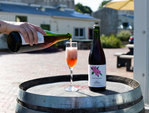


PITTSBORO — Any North Carolinian knows the state’s seasons are fickle. But in just a few short weeks, as temperatures drop and trees turn from hues of green to shades of gold and brown and rust, the real transition from summer to autumn begins.
As fall beckons, so too do the season’s delights. Ahead of those cool October nights, one Chatham County business is hoping to spotlight the distinctiveness of Southern apple-based hard ciders in its preparation of small-batch, N.C.-sourced blends.
A comfort drink
Chatham Cider Works is a family-run, women-owned business operated out of The Plant, a 17-acre eco-industrial park on Lorax Lane in Pittsboro. Jim Crawford, a former Chatham County commissioner, and his wife Maureen Ahmad established the award-winning cidery in 2008 and began operations in 2015 after a lengthy approval process; in recent years, the pair have taken a step back, with the business now managed largely by their daughter, Elise Crawford.
The business has its roots in Jim Crawford’s experiences of growing up on a farm in north central Pennsylvania. Though cider was a regular farm product, it wasn’t particularly popular commercially in the U.S. at the time, Elise said.
In the early 2000s, Jim and Maureen tasted a French cider they both enjoyed for its drier qualities and yeasty note, while still being fruit-forward.
“And that was the style that they enjoyed, and they couldn’t find it anywhere here in the States at the time,” Elise said. “And so they decided why not make it?”
Since then, Chatham Cider Works — the only cidery in the county — has taken home awards for its products at a number of contests, from the New York International Cider Competition to the North Carolina Mead-Cider-Fruit Wine Competition.
Elise, 25, who graduated from Appalachian State University in 2019, said taking over day-to-day operations has been a learning process. From fermentation and barrel-aging to carbonation and bottling, all the production processes apart from harvesting and juicing take place in the 1,020-square-foot facility at The Plant.
Chatham Cider Works’ products are available in bottles or on tap at businesses across the county, such as bmc Brewing, Red Moose Brewing and Fair Game Beverage Company, as well as other locations in the state like Wild Dogs Brewing Company in Sanford and Blue Dogwood Public Market in Chapel Hill.
Elise said she never expected to become so deeply involved in Chatham Cider Works. When her parents started operations in 2015, she wasn’t yet 21, so her participation was limited to cutting apples or working on marketing. It wasn’t until the pandemic, when her father needed more help at the cidery, that she left her previous job in corporate event planning to assist in daily operations.
Now, she splits her time between Chatham Cider Works and being event manager at The Plant.
“I was not a trained cider maker by trade,” Elise said. “But I am learning and I have great teachers.”
The cidery sources all its apples within state, mainly from Hendersonville, and produces four main varieties: Carolina Crisp, made purely from apples with a champagne style yeast; Highway 64, a barrel aged-version of the Carolina Crisp; Pink Dogwood, also an offshoot of the Carolina Crisp with muscadine grape and tart cherry; and Backyard Blend, a best-selling product made from apples and pears across the Triangle.
At the moment, Chatham Cider Works is in the full swing of things — on Friday, the cidery received a 600 gallon-supply of juice to ferment, the last of two shipments for the year.
Cider is most popular from fall to winter, Elise said.
“It’s kind of one of those comfort drinks,” she said.
Typically the apples used by Chatham Cider Works are harvested from orchards in western N.C. from late July through September, and are pressed by just one supplier in Henderson County. The cidery uses a variety of apples, including Stayman, Arkansas Black, Granny Smith, and McIntosh apples, as well as crab apples and pears to make its products.
Chatham Cider Works’ products typically fall between 7% and 11% alcohol by volume, though its flavor profiles and ABV levels are often dependent on a year’s particular crop.
Cider is technically closer to a fruit wine, but is often marketed and treated more like a beer, Elise said. Those distinctions have proven interesting in navigating its state regulations — part of the reason it took as long as it did between the business becoming incorporated and starting operations and producing beverages for sale, she said.
The business’ dedication to local suppliers and produce is something that Ahmad, Elise’s mother, says is a signature of their cidery.
When Chatham Cider Works first started out, Ahmad said she believes it was the ninth cidery in North Carolina.
“I think each cider maker brings their own signature to things,” she said. “I would say that our signature is we exclusively use North Carolina apples. So we don’t buy juice from commercial sources on the open market.”
Additionally, being a small-batch cidery allows the family to try out different varieties. Occasionally, they’ll make hyperlocal custom blends that include other fruits like blackberries, strawberries and even passion flowers.
“We can be very experimental, because we are not obliged to produce large amounts of any one flavor,” Ahmad said.
Southern-based, women-owned
Having the chance to work alongside her daughter — something she’d also never expected — has been a “fun” experience, Ahmad said.
Both Ahmad and Elise noted that being connected to other women-owned cideries has been significant, especially in an industry dominated by men — a recent survey conducted by the Brewers Association found that male brewery owners outnumber female owners three-to-one.
Still, the Chatham Cider Works’ owners say they find the cidery business to fare slightly better in their personal experiences.
“We have a number of North Carolina cider colleagues who are women,” Ahmad said, pointing to women in the local craft beverage business like Becky Starr of Starrlight Mead and Carmen Rice of bmc Brewing, neighbors of Chatham Cider Works at The Plant.
“And it’s been wonderful to have that community of people and just to know that there are women out there who are very independently running their own operations,” Ahmad continued.
Both Ahmad and Crawford said they were proud of the direction Elise has been taking the business, highlighting her unique blends and use of flavors like coffee and hot cider. In particular, Crawford said he feels it’s better for the cidery’s profile of products that someone younger and more in tune with a growing market is taking the lead.
“I’m very proud that the company is up and running, and she’s able to take care of it,” he said.
When it comes to Southern ciders, Elise wants to help put the region’s beverages on the map.
“It’s interesting that for so long, cider just wasn’t necessarily a part of the beverage culture of the South,” she said. “It was kind of an overlooked product.”
The Backyard Blend is one of the cidery’s most popular drinks, Elise said. The apples usually come from nearby counties, the Crawford’s small family orchard and even donations from people who don’t know what they want to do with their own backyard apples but don’t want them to go to waste.
She sees the Backyard Blend as a way for people to “pay tribute to the fruit that is in our backyards,” as the cidery often uses “ugly” apples that wouldn’t typically be sold in stores because of their appearance.
“[Making the Backyard Blend is] a little bit of a labor of love but I think it really speaks to what we’re trying to do,” she said. “And the message we’re kind of trying to share about the apples that come from here — that they are delicious and they make good cider.”
Val Villanueva is the bar manager at Fair Game Beverage Company, a distillery and tasting room located next to Chatham Cider Works at The Plant. Fair Game is usually the only company to get kegs of the Backyard Blend; there are typically only 10 to 15 gallons produced a year.
Villanueva estimates about 20% of Fair Game’s foot traffic comes from Chatham Cider Works’ products. The Backyard Blend is especially popular among their patrons, she said.
“Sometimes we have people just come in for their cider,” Villanueva said. “I would say [Chatham Cider Works’ products are] probably the most popular cider that we carry.”
One aspect of being located in the Chatham Beverage District that Elise especially appreciates is the community network that exists at The Plant, whether it’s businesses selling each other’s products or sharing resources and staff.
The cidery is currently managed by Elise, her parents and the occasional helper (often an employee from a neighboring business at The Plant), but she hopes to hire a team to assist in operations and production over the next year.
Chatham Cider Works is also looking to start canning its products and get more varieties approved for commercial sale from the Alcohol and Tobacco Tax and Trade Bureau and the North Carolina Alcoholic Beverage Control Commission. As the weather cools down, the cidery may soon have a spiced cider in its seasonal lineup, pending recipe approval.
“Right now, we’re kind of sustaining, which is fantastic for a small business,” Elise said. “That is never a bad thing, but my hope is that we can grow it a bit more in the coming years.”
Reporter Maydha Devarajan can be reached at mdevarajan@chathamnr.com and on Twitter @maydhadevarajan.